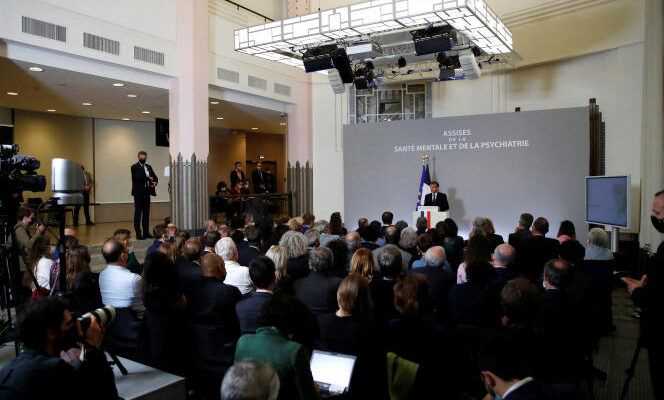Because mental health is “Everyone’s business”, Emmanuel Macron announced at the end of the Assises on the subject, Tuesday, September 28, the reimbursement of consultations with psychologists for all French people. While this announcement has been scrutinized with interest both by professionals in an underprivileged sector and by patient associations, there are still questions relating to the modalities of its implementation and the expected effectiveness.
From 2022, according to the president’s announcement, consultations with psychologists may be reimbursed in full if they are carried out on the prescription of a doctor, within the framework of a tariff agreed between the psychologist and the Health Insurance. According to Patrick-Ange Raoult, secretary general of the National Union of Psychologists (SNP), it is not planned that psychologists can practice excess fees, unlike a doctor approved for sector 2. The first consultation will cost 40 euros, and subsequent ones, 30 euros. This support will be limited in time, with a fixed price of ten sessions renewable once. The funding will be shared with complementary health insurance, without knowing yet in what proportion.
According to the Ministry of Solidarity and Health, all children aged 3 years and over, adolescents and adults with “Mild to moderate depressive and anxiety disorders” are concerned, as well as their families. Psychologists will participate on a voluntary basis, whether they work as a liberal or as employees of a health center or house. They will also be able to continue to exercise their activity by applying their own prices, without reimbursement.
The device must be clarified in the context of the parliamentary examination of the Social Security financing bill (PLFSS) for 2022. It is accompanied by the creation of 800 positions in medico-psychological centers.
According to the last part of the CoviPrev survey by Public Health France, between August 31 and September 7, 15% of French people were depressed. This is five points higher than before the start of the pandemic. And 23% show signs of an anxious state, a ” high level “, according to this survey, ten points higher than the non-epidemic level, and on the rise.
According to the National Federation of French Mutuals, the health crisis has encouraged the development of reimbursements for psychological consultations by mutuals, which have found their audience: 512,000 members have requested at least one reimbursement between the end of March and the end of August 2021. , while they were only 200,000 for the whole of 2019.
The government plans to devote 50 million euros to this measure in 2022, then 100 million per year, which meets a recommendation of the Court of Auditors in its february report on “Pathways in the organization of psychiatric care”. Applauding the experimentation of the device in four departments, the Court then estimated at 85 million euros its extension to the whole of the territory. By observing the situation in other countries, she even estimated that the device could generate a net gain. “Thanks to the drop in prescriptions for work stoppages in particular, as well as that of the prescription of psychotropic drugs”.
“Going to see a psychologist when you have a depressive disorder is a preventive action”, abounds Séverine Salgado, the general manager of the French Mutuality, who quotes a study of Journal of Mental Health Policy and Economics published in 2013, according to which one euro of public money spent on psychotherapy for depression can lead to a gross saving of almost two euros.
What have we learned from the experimentation in four departments?
A device similar to the one presented on Tuesday has been tested since 2018 in Bouches-du-Rhône, Haute-Garonne, Morbihan and Landes. It only targets patients between the ages of 18 and 60. More than 30,000 people have benefited, according to a Medicare report published in July. Some 58% of general practitioners from these departments participated, as did 45% of psychologists approved by regional health agencies. On average, a patient followed nine support sessions, with an average duration of care of four months. “The feedback from professionals demonstrates the feasibility (…) of the device, its good level of acceptance (…) and the first elements of efficacy for patients ”, welcomes Medicare.
What do psychologists and doctors think?
Not all professionals share this satisfaction. Patrick-Ange Raoult, of the SNP, criticizes in particular the passage through a doctor’s prescription. According to him, not only does this compulsory step in no way improve the accessibility of psychological care, but it also represents a ” qualifying “ and an “Medical grip” on psychologists, who should not be reduced to a “Paramedic position”.
Then there is the issue of compensation. According to Mr. Raoult, a classic psychology session is billed at 60 euros on average. By capping it at half as much in the agreed device, “We know which professionals will volunteer: young people looking for integration and ready for anything. It will not interest the old seasoned professionals, it is a psychology for the poor ”.
Jean-Paul Hamon, Honorary President of the Federation of Doctors of France, believes that this measure is a ” water drop “ and fears, too, a “Deterioration in the quality of patient care, regardless of the quality of psychologists”. He sees the presidential announcement as a backfire to distract from the real emergency, namely the “Desertification” psychiatry, “Specialty that no longer attracts”. And to recall that 71 internship positions in psychiatry were not filled this year.
For Jacques Battistoni, the president of the union of general practitioners MG France, it is a ” good thing “ than’“Increase the range of solutions for patients”. Today, mental health represents 20 to 30% of consultations with general practitioners, he considers: the possibility of sending a patient to the psychologist is able to“Lighten” this workload because, in the absence of psychotherapy, doctors “See people more often”.
